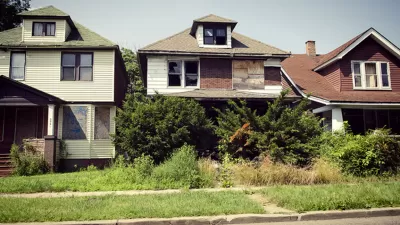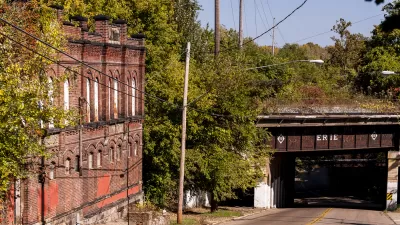Proposal N, on the ballot for Detroit voters next week, will provide $160 million in bond funding for demolitions and $90 million to mothball homes for future rehab, but, according to this opinion, it won't solve the city's blight challenges.

[Updated November 3, 2020] Eric Kehoe, provides commentary on Proposal N, which will appear before voters in the city of Detroit on Tuesday as a piece of the city's response to the vacant properties in the city by approving a "taxpayer-funded bond measure that would primarily pay to demolish vacant properties in the city."
Kehoe writes on the subject as an urban planner, former president of Preservation Detroit, and a founding member of Detroiters for Parking Reform, suggesting that a regional approach to blight and vacancies might be effective at solving Detroit's problems. First of all, Proposal N won't solve blight, according to Kehoe, because demolitions don't necessarily work as a catalyst for new development:
The idea that “if you clear it, they will build” hasn’t been backed up elsewhere, either. Research by Jason Hackworth shows that demolition-only policies have left 269 Rust Belt neighborhoods — including some in Detroit — segregated and value-depressed, often leading to further decline.
To explain why demolition doesn't necessarily seed reinvestment in Detroit specifically, Kehoe points to the effects of sprawl:
As land in Detroit neighborhoods continues to sit vacant, it’s overly optimistic to think that a focus on demolition will tip the scale for redevelopment. The underlying issue is a sprawling regional footprint that continues unabated. And that sprawl is linked to discrimination in our region.
Even if Detroit voters approve Proposal N, the city's vacant properties and blight problem will remain, according to Kehoe, and an unprecedented regional approach is necessary to solve these challenges.
"To curb sprawl, municipalities could work together to create greenbelts or urban growth boundaries to limit the development of new land. Passing a regional transit plan would help shift the population’s reliance on cars, encouraging compact redevelopment along public transit corridors," writes Kehoe
FULL STORY: Detroit shouldn't have to tackle blight alone. Look for a regional solution.

Maui's Vacation Rental Debate Turns Ugly
Verbal attacks, misinformation campaigns and fistfights plague a high-stakes debate to convert thousands of vacation rentals into long-term housing.

Planetizen Federal Action Tracker
A weekly monitor of how Trump’s orders and actions are impacting planners and planning in America.

In Urban Planning, AI Prompting Could be the New Design Thinking
Creativity has long been key to great urban design. What if we see AI as our new creative partner?

King County Supportive Housing Program Offers Hope for Unhoused Residents
The county is taking a ‘Housing First’ approach that prioritizes getting people into housing, then offering wraparound supportive services.

Researchers Use AI to Get Clearer Picture of US Housing
Analysts are using artificial intelligence to supercharge their research by allowing them to comb through data faster. Though these AI tools can be error prone, they save time and housing researchers are optimistic about the future.

Making Shared Micromobility More Inclusive
Cities and shared mobility system operators can do more to include people with disabilities in planning and operations, per a new report.
Urban Design for Planners 1: Software Tools
This six-course series explores essential urban design concepts using open source software and equips planners with the tools they need to participate fully in the urban design process.
Planning for Universal Design
Learn the tools for implementing Universal Design in planning regulations.
planning NEXT
Appalachian Highlands Housing Partners
Mpact (founded as Rail~Volution)
City of Camden Redevelopment Agency
City of Astoria
City of Portland
City of Laramie





























